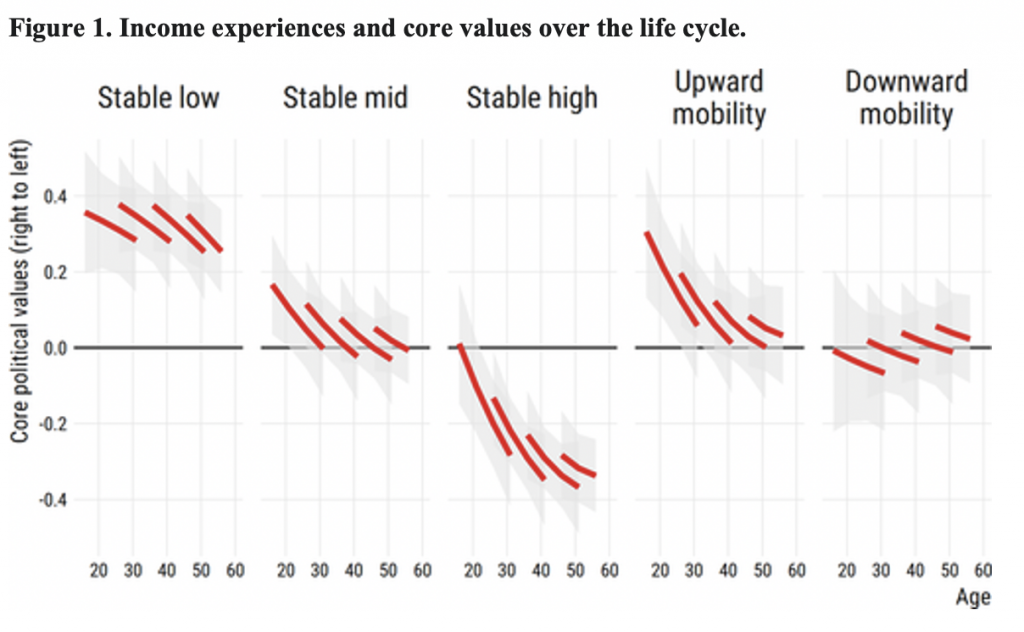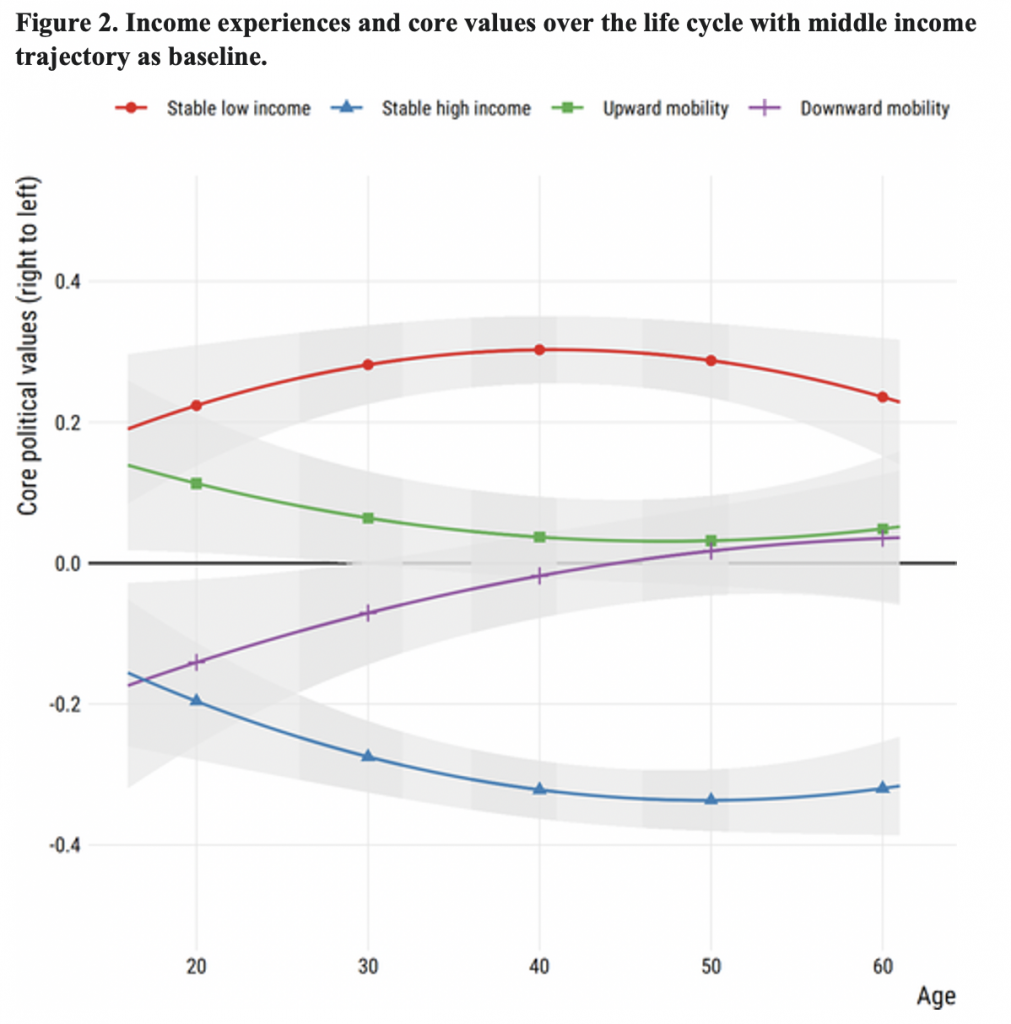
 Income and political attitudes are powerfully correlated in cross-sectional data, yet research based on panel data finds at most a weak correlation. Agnar Freyr Helgason and Philipp Rehm examine this puzzling pattern by exploring the long-term evolution of attitudes over the life cycle. They find that the correlation between income and political attitudes emerges because attitudes crystallise – slowly but systematically – as income evolves over the life cycle. This pattern is most consistent with the learning explanation.
Income and political attitudes are powerfully correlated in cross-sectional data, yet research based on panel data finds at most a weak correlation. Agnar Freyr Helgason and Philipp Rehm examine this puzzling pattern by exploring the long-term evolution of attitudes over the life cycle. They find that the correlation between income and political attitudes emerges because attitudes crystallise – slowly but systematically – as income evolves over the life cycle. This pattern is most consistent with the learning explanation.
Does income shape political attitudes? There is plentiful evidence that there is a powerful association between income and many kinds of political attitudes, including preferences toward redistribution. From a theoretical perspective, this aligns well with a prevalent view in the social sciences that emphasises the importance of material circumstances in determining political attitudes. However, recent evidence suggests that there is, at most, a weak correlation between (changes in) income and (changes in) attitudes. This would seem to suggest that income only weakly shapes attitudes – if at all.
In a new paper, published in the European Journal of Political Research, we argue that these seemingly contradictory findings have emerged because existing scholarship on the link between income and attitudes focuses on static or short-term relationships between the two variables. To advance the scholarship, therefore, we analyse the evolution of political attitudes over people’s life cycle and explore to which extent, if any, they are shaped by income experiences.
We find that the association between economic experiences and political attitudes evolves incrementally and gradually over people’s lives. In other words, small changes from year to year cumulate over long periods of time to large differences between individuals with different experiences. The pattern of attitude evolution that emerges from the data, then, can be described as a process of learning: attitudes are anchored by early life experiences and socialisation, but economic circumstances do nudge them, often in line with expectations from material self-interest theories, but gradually and over long periods of time.
Our study is based on the British Household Panel Survey, a wide-ranging panel study that followed the same sample of individuals from 1991 to 2008. We analyse the evolution of ‘core political values’, defined as fundamental and enduring attitudes towards general moral and political principles like equality’, using a methodological approach suitable to study the evolution of attitudes over the lifespan.
We explore the evolution of political attitudes based on different ‘income experiences’. In particular, we compare and contrast five different trajectories: Individuals with stable low, middle, or high income, individuals who are upwardly mobile, and individuals who are downwardly mobile.
 Figure 1 plots the predicted core values for the five different income experiences (vertical axis) against age (horizontal axis). The figure shows how attitudes change over people’s lifespan as a function of different income experiences and we can therefore assess whether and when attitudes change, and whether income experiences are associated with attitude change. To ease comparison between the income experiences, we set the middle income group as the baseline group in Figure 2, which removes both average ageing and cohort effects from the plot, allowing us to directly assess relative differences between income experiences.
Figure 1 plots the predicted core values for the five different income experiences (vertical axis) against age (horizontal axis). The figure shows how attitudes change over people’s lifespan as a function of different income experiences and we can therefore assess whether and when attitudes change, and whether income experiences are associated with attitude change. To ease comparison between the income experiences, we set the middle income group as the baseline group in Figure 2, which removes both average ageing and cohort effects from the plot, allowing us to directly assess relative differences between income experiences.
We take away several key results from the figures. The data show that at around age 16, (future) income experiences already structure attitudes. The gap between respondents that will have stable low income and stable high income, respectively, is about one-third of a standard deviation, a substantial difference.
However, the two figures also reveal that as respondents age, core values do change. We find that attitudes become increasingly congruent with income experiences: the attitudinal gap between the stably poor and stably rich increases with age. This process of attitude crystallisation peaks at around age 45. At that age, the stable low and stable high-income groups are separated by about two-thirds of a standard deviation, which is double the early life difference.
From a theoretical perspective, comparing the stable income groups to the mobile income groups is perhaps most revealing. The figures show that the starting point of these groups is comparable: the upwardly mobile have attitudes like the stable low-income group, at the beginning of their journey. But as they become rich, their attitudes become markedly more conservative. However, the attitudes of the upwardly mobile are not as conservative as the attitudes of those who have stable high income. Rather, they have attitudes that are very similar to those with stable middle income – somewhere in between the stable low and stable high groups. The pattern for the downwardly mobile is the mirror image: they start out like the stable high-income group, become sharply more progressive as they get poorer, and end up somewhere in the middle of the attitudinal scale. This pattern suggests that ‘history matters’: someone who has high income has more conservative attitudes if they always were rich compared to someone who was upwardly mobile and ended up being rich.
Overall, then, the data suggest that people adapt their political attitudes to their economic experiences, but that this process is slow, cumulative, and partial. Attitude change is – at least on average – slow and incremental. But over long periods of time, small changes in attitudes ‘in the right direction’ accumulate to substantive cross-sectional differences between individuals. The typical approaches to study the relationship between income changes and attitude – individual-level fixed-effects or first-difference estimations – cannot readily detect such cumulative and slow-moving processes while the lifespan perspective in our article can.
Our approach and findings raise some important new questions which we believe deserve more scrutiny in future research. Our goal in this paper was to establish the relationship between income experiences and political attitudes over the life cycle. As it turns out, our findings suggest a slow and incremental relationship, but we do not know the exact reason for this relationship. For example, we find that the stably poor and the stably rich keep becoming more and more progressive and conservative, respectively, at least until age 45 or so.
We do not know why. One possibility is that income experiences are a socialisation process: respondents align their attitudes with those around them, and the longer they are in the same income position, the more aligned are their attitudes with their peers. Another possibility is that people align their attitudes with their (uncertain) cumulative life-time income: as time goes by, they learn more and more about their position in the income distribution and adjust their attitudes accordingly. Yet another possibility is that particular income experiences (such as poverty) alter the way people think about society and politics once and for all, no matter what happens to them afterward. We think these are among the many interesting open questions for future research and believe that our approach can help in advancing our knowledge about the sources and evolution of political attitudes.
___________________
 Agnar Freyr Helgason is Senior Lecturer in the Faculty of Political Science at the University of Iceland.
Agnar Freyr Helgason is Senior Lecturer in the Faculty of Political Science at the University of Iceland.
 Philipp Rehm is Associate Professor of Political Science at Ohio State University
Philipp Rehm is Associate Professor of Political Science at Ohio State University








